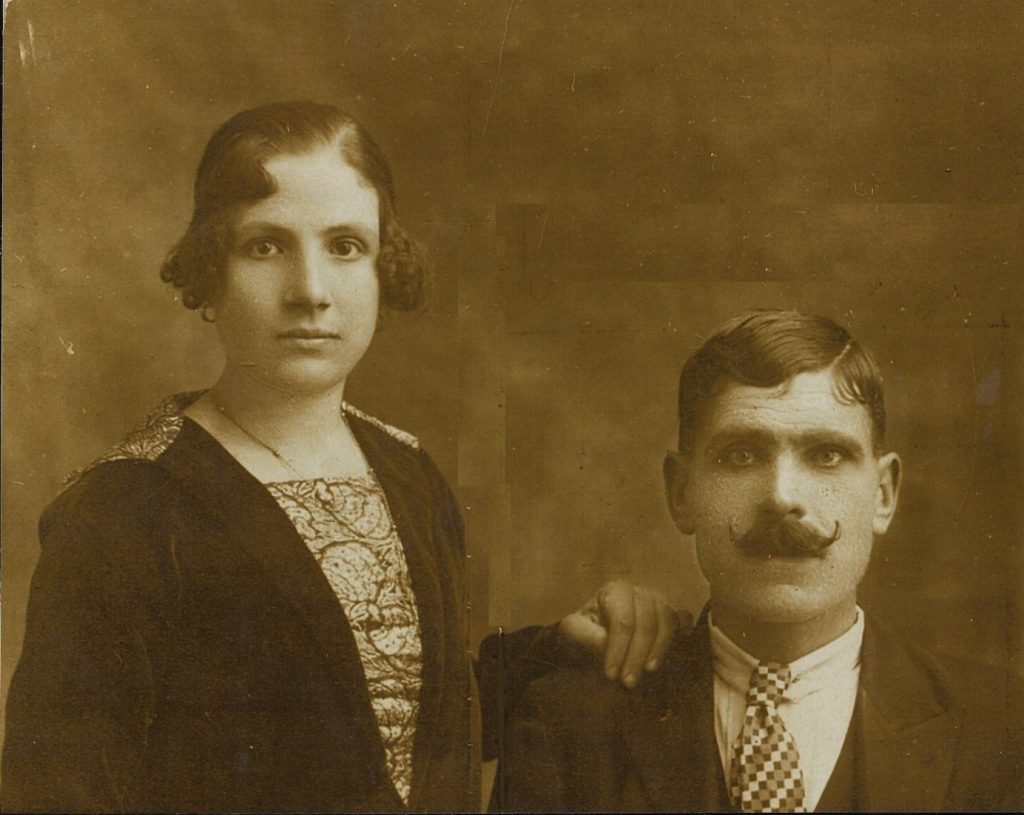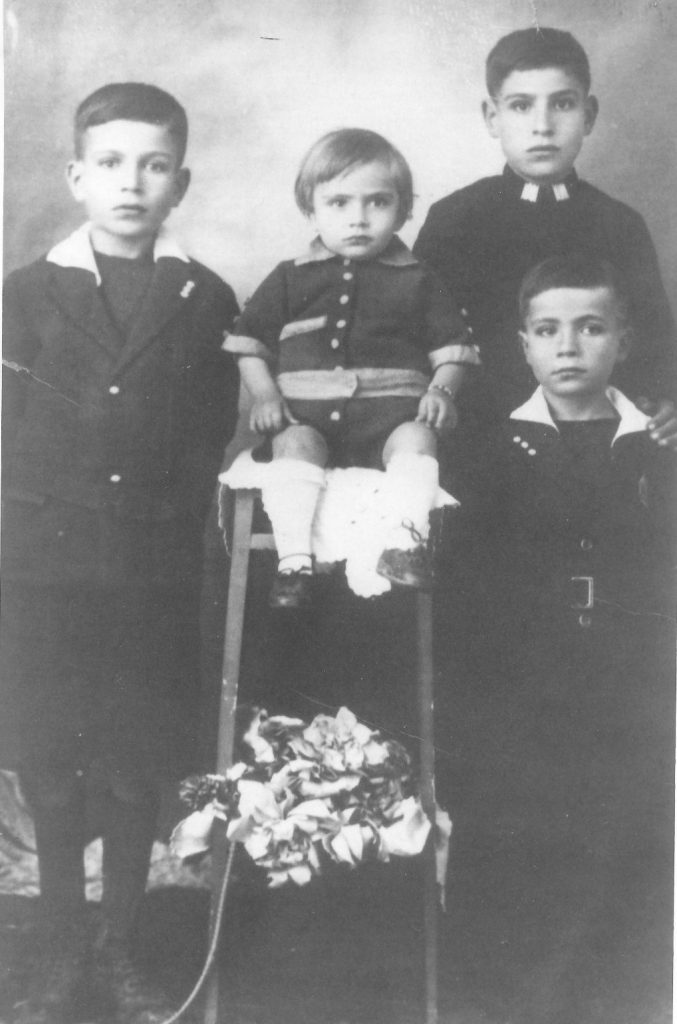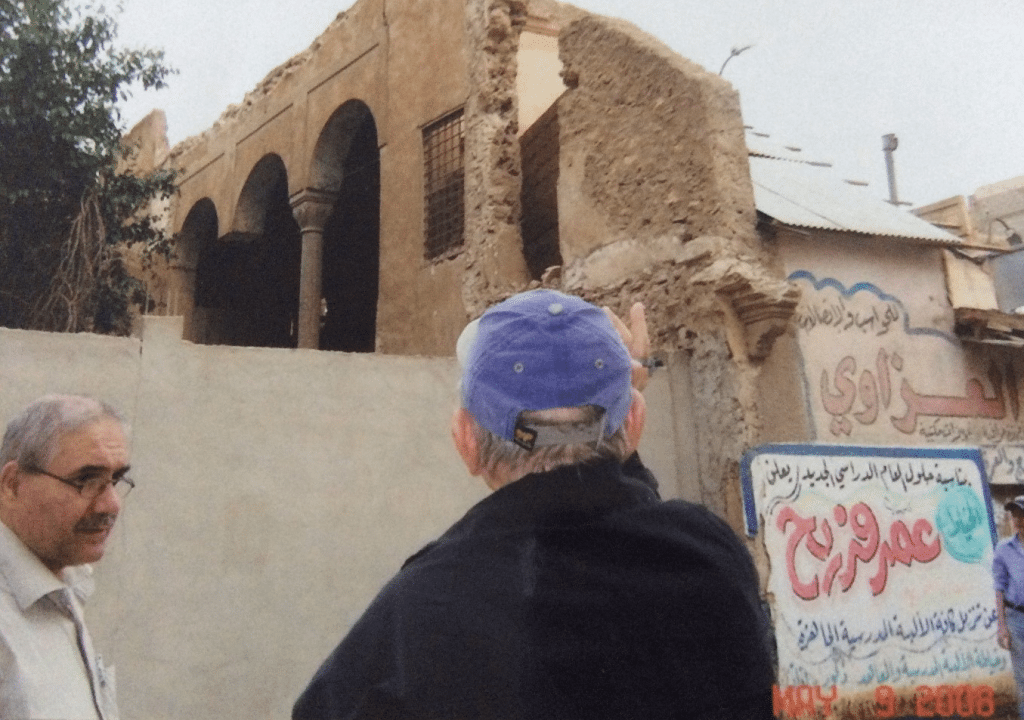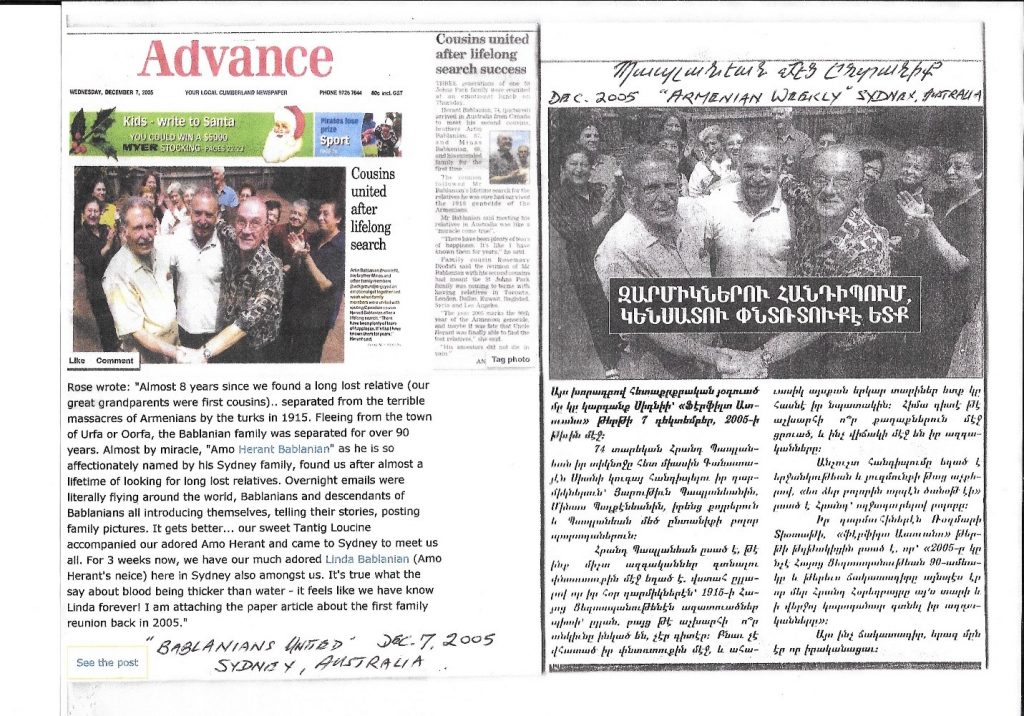By Herant Bablanian
Special for the Armenian Weekly
My parents Khanem (Poladian) and Hovhanes Bablanian were survivors of the Armenian Genocide. Sadly, my parents’ history is not unique. Ask almost any Armenian and they will share similar tragic stories told to them by their parents or grandparents. It would be a great dishonor to their memories if we remained silent.

I am lucky enough to have tape recordings of my parents Khanem and Hovhanes telling—in their own voices—what they experienced during the genocide. Below are the summaries of their stories, which were tape recorded in Baghdad, Iraq, in 1964.
***
The Story of my Mother Khanem (Poladian) Bablanian, in Her Own Words
I was born in the town of Urfa, the historical city of Yetesia, and was one of seven children in my family.
I was orphaned at the age of eight. I lost everyone in my family except for my twelve-year old brother, Garabed. He was able to flee and was saved by an Arab family. He finally ended up in Aleppo. My father and eldest brother Nerses were taken away and killed by the Turks.
Most of the Armenian women and their children were gathered and ordered to leave their homes without taking a single one of their belongings with them. The Turks claimed this was “temporary relocation,” but a huge caravan of Armenian women and children were deported south to the harsh Syrian desert, accompanied by the armed Turkish Gendarme (officer). We marched for days and my grandmother could not walk any further due to the pain in her legs. She was falling behind and the Turkish Gendarmes were impatient. Eventually, they shot her.
My mother also grew tired, she couldn’t carry the sick baby anymore. She knew that the child would die soon because she did not have enough milk to feed her. Mother kissed the small bundle, held it tight to her heart and later put her down on the side of the road. Soon afterwards, my mother became so weak due to exhaustion and illness.
One night, I was awakened by my mother crying out “Khanem, Khanem, cover me please, I am so cold.” I said, “But mother, I have nothing to cover to cover you with!” Then, I threw myself upon her. But there was not enough warmth left in either of us.
The next morning, as I pulled myself off of her, I realized she was dead. I was left alone with my little brother and sister Haygazoon and Paylazoon. I was crying, confused, and bewildered and somehow lost them in the crowd. I looked everywhere, but I couldn’t find them.
Until now, I can’t forgive myself for losing them. I hope they are still living somewhere. Finally, the caravan made it to Deir ez-Zor (Der Zor), where I was taken in by a well-known and respected Arab family—the Al-Matroud family. They looked after me and treated me well. At last, the war was over, the Allies won, the Turks were defeated. An American orphanage was opened in Deir ez-Zor. The Armenian orphans were gathered and admitted to the orphanage. There I stayed until my brother Garabed found me and we went together to Aleppo.
The Story of my Father Hovhanes Bablanian, in His Own Words
I was born in Urfa and had five siblings. Only two of my brothers survived. During WWI, at age of 20, I was taken away by the Turks in the Labour Battalion. Fortunately, I was able to flee, escaping the death that was premeditated for the rest of the Armenian Labour Battalion.
In Aleppo, I was arrested by the Turks for being a deserter. However, I was able to convince them that I was sick and was left behind by my regiment. I was admitted into a Turkish military hospital, and was given the job as assistant in the kitchen. When the head chef disappeared, I became known as the new chef, Chef Aziz. I held this job until I suddenly found my eldest brother Sarkis, who was also a deserter.
We ran away to a safer area. By then, it was almost the end of the war and the Turks were defeated. Sadly, I learned that my sister Markrid threw herself in a well to avoid being captured by the Turks. Unfortunately, I do not know what happened to my youngest sister Yester. My brother Haroutyun managed to stay alive and ended up in Jerusalem, while my youngest brother Hagop stayed in Urfa, joining the Armenian Resistance of Urfa—the Herosamart—fighting against the Turks, was killed and martyred as a freedom fighter.
***
In Search of Long Lost Relatives
Once the war was over, my mother and father were introduced to each other by some friends and were married soon after. Afterwards, they moved back to Urfa, pushed out again to Syria, and later ended up in Iraq. They had four sons: Hagop, born in Urfa, Nerses and Boghos born in Damascus, and myself, Herant, born in Kirkuk, Iraq in 1931.

Through the years, I have never stopped searching and looking for relatives—long lost as a result of the genocide. My search was more fruitful and rewarding than I could have ever imagined.
First, I followed my mother’s story. In 2008, we traveled to Aleppo and Der Zor, and finally found the children of the Al-Matroud family who looked after my mother.
Two of the brothers I met were medical doctors, and their family name is still well known in Deir ez-Zor. They were very excited to see us, and quite surprisingly, were aware of my mother’s story as well. They all treated us kindly—like family—and showed us the house where my mother used to live. Since this visit, we have stayed in touch with each other.

On the first-year memorial of my late son Ara at the Armenian Church of Toronto in 2005, an elderly lady I did not know approached me. She explained that she couldn’t help herself after hearing my family name.
She told me that I had relatives in Aleppo and Australia and provided me with details and telephone numbers. Thanks to this “angel,” we found cousins in Australia in 2005. There, we met almost 200 Bablanians! Our family tree was confirmed and we are now in touch and visit each other often.

In 2008, we met more cousins in Aleppo, and while in Yerevan, thanks to the Armenian telephone operator there, I met more Bablanians in Yerevan and was told that there are more in Shatin village near Noravank.
Now, more than a century after the Armenian genocide began, family members all over the world are united—Bablanians in Toronto, Sydney, London, Aleppo, Beirut, Yerevan, Los Angeles, San Diego, Orange County, Dallas, Baghdad, Kuwait, Amman, and maybe in some other places we have not discovered yet.

11 Comments To "In Their Own Words: From Firsthand Stories of the Armenian Genocide to the Bablanian Family Reunion"
#1 Comment By Sandra Vartanian On June 23, 2017 @ 3:53 pm
A very Interesting Story. You were lucky. Armenian Weekly use to list names of Orphans. List of names were posted in the Armenian Coffee House; when trying to locate Family Members. Did you try writing to the different Orphanages to locate those two lost children. If they were old enough; they might have survived.
#2 Comment By Herant Bablanian On April 23, 2018 @ 1:15 pm
Thank You Sandra, I am sorry for not responding earlier to your sensible advice.
#3 Comment By Sandra Vartanian On June 23, 2017 @ 11:32 pm
I enjoyed this article very much.
#4 Comment By Rita Voskan (Arnold) On June 30, 2017 @ 7:56 pm
Thank you or sharing, such an interesting story.
#5 Comment By Anita Bablanian Hayek On April 22, 2018 @ 2:23 pm
Thank you uncle for writing our grandparents story . It’s a very sad one but it’s our story. I loved them both. I’m sure they are in good hands now in heaven. Yes it was wonderful to find our cousins in Australia 🇦🇺. I always thought that I have only few cousins but thank God I have now around 200 some very close and some far cousins. But it’s a wonderful feeling.
#6 Comment By Bader Al Moulah On August 19, 2019 @ 7:58 am
This is beautifully written. I was wondering if you knew what the meaning of Bablanian was?
#7 Comment By Herant Bablanian On April 24, 2020 @ 11:50 pm
Thank you Bader for appreciating my parents biography. As to the meaning of Bablanian is courages and I think it comes
from the word Babylonia.
#8 Comment By amanda riso On October 31, 2019 @ 9:19 am
i used this article for a school project. thank you for sharing your story!
#9 Comment By Herant Bablanian On April 24, 2020 @ 11:56 pm
Thank you very much Amanda for sharing my parents story in your school project.
#10 Comment By Celine Hayek On April 28, 2020 @ 12:34 am
Uncle Herant! Beautifully written. Thank you for sharing and being so inquisitive. It’s because of you and your curiosity that we can now say we have more relatives than we thought we had. Love you!
#11 Comment By hanan Taj On February 23, 2021 @ 7:57 pm
Mr Herant
So sad story. I am looking for pictures of Boghos’s paintings. His name and activities disappeared in Baghdad after 1958